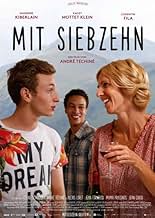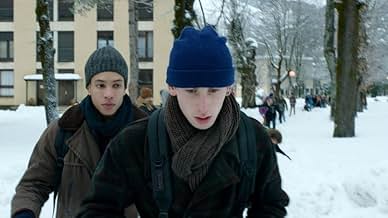Quand on a 17 ans
- 2016
- Tous publics
- 1h 54min
NOTE IMDb
7,2/10
7,6 k
MA NOTE
Damien vit avec sa mère Marianne, une docteure, tandis que son père est en service militaire à l'étranger. Il est harcelé par Thomas, dont la mère est malade. Les garçons doivent vivre ensem... Tout lireDamien vit avec sa mère Marianne, une docteure, tandis que son père est en service militaire à l'étranger. Il est harcelé par Thomas, dont la mère est malade. Les garçons doivent vivre ensemble quand Marianne décide de recueillir Thomas.Damien vit avec sa mère Marianne, une docteure, tandis que son père est en service militaire à l'étranger. Il est harcelé par Thomas, dont la mère est malade. Les garçons doivent vivre ensemble quand Marianne décide de recueillir Thomas.
- Réalisation
- Scénario
- Casting principal
- Récompenses
- 2 victoires et 12 nominations au total
Avis à la une
In 'Being Seventeen' we meet Damien (Kacey Mottet Klein), who is surprised when his mother Marianne (Sandrine Kiberlain) calmly accepts his declaration of sexual attraction to a classmate. But why would she be surprised? Damien's candy-coloured rhinestone earring hardly shouts 'macho man'. But it is fair to say he is not the stereotypical film closeted homosexual: he enthusiastically takes boxing lessons from a friend of his army pilot father; and he is not even sure whether it is men generally he is attracted to, or just that particular classmate: Thomas (played by male model Corentin Fila).
The trouble with Damien's attraction to Thomas is that the latter bullies the former. But when Marianne, the local doctor in the Pyrenean community, hospitalises Thomas' weak, pregnant mother, she invites him to stay with her and Damien, and so the two boys are thrown together...
There are occasions when this film loses the way: Damien and Thomas are plainly the centre of the story, so sequences focusing exclusively on Marianne seem pointless and add little to the main story. But Kiberlain certainly provides a decent performance as the friendly mother who chats happily to the boys while serving them a glass of after-school wine (did I mention this is a French film?), before a personal tragedy means she must pull her life back together. Fila and Klein are given likable characters to play - Thomas concerned by his mother's condition; Damien the bully's victim - and also turn in good performances.
But the best aspect for me is the scenery: director André Téchiné gets the best of filming in the Pyrénées, with the endless snow-covered mountains (most of the filming seems to have taken place during the depths of winter) gradually giving way to deep, verdant valleys as the film and seasons progress. But it is not just a travelogue - this film is well worth seeing for its take on awakening sexuality.
The trouble with Damien's attraction to Thomas is that the latter bullies the former. But when Marianne, the local doctor in the Pyrenean community, hospitalises Thomas' weak, pregnant mother, she invites him to stay with her and Damien, and so the two boys are thrown together...
There are occasions when this film loses the way: Damien and Thomas are plainly the centre of the story, so sequences focusing exclusively on Marianne seem pointless and add little to the main story. But Kiberlain certainly provides a decent performance as the friendly mother who chats happily to the boys while serving them a glass of after-school wine (did I mention this is a French film?), before a personal tragedy means she must pull her life back together. Fila and Klein are given likable characters to play - Thomas concerned by his mother's condition; Damien the bully's victim - and also turn in good performances.
But the best aspect for me is the scenery: director André Téchiné gets the best of filming in the Pyrénées, with the endless snow-covered mountains (most of the filming seems to have taken place during the depths of winter) gradually giving way to deep, verdant valleys as the film and seasons progress. But it is not just a travelogue - this film is well worth seeing for its take on awakening sexuality.
So this is what being 17 feels like?! This is a slow-moving, mundane yet beautiful, subtle drama that captures the bleak lives of two teenage boys, both living in different family backgrounds. Accompanied by constant shivering snowfalls, they both end up feeling 'something' between them.
This is a simple come-of-age story that doesn't show us usual intensity of gay relationships or obvious flow of surging passion (that concludes with I-love-you or I-like-you confessions). On the contrary it is more about wavering confusion and love-hate tension that grows between two adolescent boys studying in the same institute.
What makes it different from other gay films of similar themes is its ability to grip your attention and tease you with slightly puerile curiosity about: "will they come together?"
There are several unique elements that work as essentials of this story: sense of solitude, fierce jealousy, suppressed infatuation, silent expectations, teenage ego, and of course, the urgent hatred that often emerges from helpless, pent-up affection.
I especially loved the natural, engaging and poised performances of two young actors who seemed to know what they were supposed to do on screen - they appeared quite involved and effortless. Exhilarating indeed!
This is a simple come-of-age story that doesn't show us usual intensity of gay relationships or obvious flow of surging passion (that concludes with I-love-you or I-like-you confessions). On the contrary it is more about wavering confusion and love-hate tension that grows between two adolescent boys studying in the same institute.
What makes it different from other gay films of similar themes is its ability to grip your attention and tease you with slightly puerile curiosity about: "will they come together?"
There are several unique elements that work as essentials of this story: sense of solitude, fierce jealousy, suppressed infatuation, silent expectations, teenage ego, and of course, the urgent hatred that often emerges from helpless, pent-up affection.
I especially loved the natural, engaging and poised performances of two young actors who seemed to know what they were supposed to do on screen - they appeared quite involved and effortless. Exhilarating indeed!
10Alger_P
This movie is the best-directed contemporary gay love story I've ever seen. It doesn't over- dramatize the stigma that all gay youth deal with when coming out to themselves and others, but it doesn't pretend such stigma isn't important. It presents attraction and love and friendship and family and desire as the complexly interwoven mess that it always is, but is so rarely seen in media. It shows love as not the solution to all your problems, but also that it doesn't have to be tragic. It portrays traditional families charitably, alongside gayness - they don't have to be natural enemies, but they have different dynamics which are usually either ignored or treated one-dimensionally. Most importantly, this film describes coming out as it really is: a profoundly individual act, and usually played out non- tendentiously and in a narrative completely unique to that individual. Most coming out films I've seen swerve into clichés and predictable outcomes. Although this film's plot resolution is fairly conventional, somehow the characters' authenticity, uniqueness and vulnerability fulfilled the story in a deeply touching, yet unsentimental way. Bravo.
If you're not gay, you might think this movie is nothing special, the way some straight people I know thought Brokeback Mountain was tripe, not paying any attention to the repression central to that story. The moving qualities in this film are mostly a coming-out thing, so perhaps straight people won't relate, but there are glimmers here (and in our times) of that narrative holding enough substance to speak to universal truths.
If you're not gay, you might think this movie is nothing special, the way some straight people I know thought Brokeback Mountain was tripe, not paying any attention to the repression central to that story. The moving qualities in this film are mostly a coming-out thing, so perhaps straight people won't relate, but there are glimmers here (and in our times) of that narrative holding enough substance to speak to universal truths.
I wasn't really sure what to except out of this film, but to classify it as simply an LGBT film would be a great disservice to what it's doing. There aren't just two leads here, there are three, and that is crucial to the importance of it. The screenplay is layered and filled with small gestures and moments that mean a lot to the characters, but ones we have to be attentive to. This is a little film made out of moments like that and if people aren't used to it and don't like that kind of storytelling, they may not take to this film. It's subtle and very nuanced where it counts, and that's why it stands apart from the rest of its like.
In a small town in the mountainous Pyrenees region of France, two teenage boys in the same grade have an intense dislike for each other: Damien (Kacey Mottet Klein) who lives in a pleasant house in town and whose family is well-off; and Tomas (Corentin Fila) who is bi-racial and adopted by a farm family whose home is a long distance from town. Lurking beneath the mutual contempt is a sexual tension.
The beautiful location enhances the charm and depth of this moving film. In addition to the story of the two boys, there are subplots in each of their families that add greatly to the story overall. While the story of the boys' conflict seems to linger too long, the movie can be credited for being unpredictable and full of surprises.
The characterization of Tomas is particularly rich and filled with contradictions. In one moment, it is easy to despise him for his bullying ways; in the next moment, it is easy to pity him for his difficult daily life and the uncertainty due to a change that is about to happen in his family. Though not explicitly explored, he also has the difficulty of seeming to be the only non-white person in the small town.
The actors are both great in their roles as is Sabine Kiberlain who plays Damien's mother and is also a doctor. She's very nurturing in both roles and is also quite touching as someone in a crisis in the movie's second half.
By the film's end, one has compassion for all of its characters. - dbamateurcritic.
The beautiful location enhances the charm and depth of this moving film. In addition to the story of the two boys, there are subplots in each of their families that add greatly to the story overall. While the story of the boys' conflict seems to linger too long, the movie can be credited for being unpredictable and full of surprises.
The characterization of Tomas is particularly rich and filled with contradictions. In one moment, it is easy to despise him for his bullying ways; in the next moment, it is easy to pity him for his difficult daily life and the uncertainty due to a change that is about to happen in his family. Though not explicitly explored, he also has the difficulty of seeming to be the only non-white person in the small town.
The actors are both great in their roles as is Sabine Kiberlain who plays Damien's mother and is also a doctor. She's very nurturing in both roles and is also quite touching as someone in a crisis in the movie's second half.
By the film's end, one has compassion for all of its characters. - dbamateurcritic.
Le saviez-vous
- AnecdotesThe film's title is derived from the first verse of Arthur Rimbaud's 1870 poem "Roman": "On n'est pas sérieux quand on a dix-sept ans" ("When you are seventeen you aren't really serious"). Additionally, the poster's tagline, "L'adolescence est le seul temps où l'on ait appris quelque chose" ("Adolescence is the only period in which we learn anything") is taken from "In the Shadow of Young Girls in Flower", the second volume in Marcel Proust's novel "In Search of Lost Time". Both Rimbaud and Proust were known to be homosexual.
- GaffesAt one point, Damien changes the clock and explains that he is setting it for daylight savings time, but he moves the clock back. He should be moving it forward by an hour.
- ConnexionsReferences L'enfance - nue (1968)
- Bandes originalesYafaké
performed by Victor Démé
Meilleurs choix
Connectez-vous pour évaluer et suivre la liste de favoris afin de recevoir des recommandations personnalisées
- How long is Being 17?Alimenté par Alexa
Détails
Box-office
- Budget
- 5 500 000 € (estimé)
- Montant brut aux États-Unis et au Canada
- 52 713 $US
- Week-end de sortie aux États-Unis et au Canada
- 8 838 $US
- 9 oct. 2016
- Montant brut mondial
- 2 050 766 $US
- Durée1 heure 54 minutes
- Couleur
- Rapport de forme
- 1.85 : 1
Contribuer à cette page
Suggérer une modification ou ajouter du contenu manquant

Lacune principale
By what name was Quand on a 17 ans (2016) officially released in India in English?
Répondre























